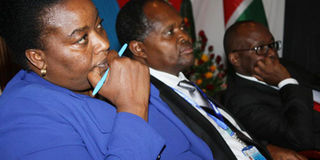Govt officials accuse human rights activists of obstructing war on terror

Interior Principal Secretary Monica Juma (left), Attorney-General Githu Muigai (right) and University of Nairobi Vice-Chancellor Peter Mbithi at a counterterrorism forum at the University of Nairobi on May 7, 2015. PHOTO | ANTHONY OMUYA | NATION MEDIA GROUP
What you need to know:
- Officials including the Interior Principal Secretary Monica Juma and Attorney-General Githu Muigai defended the government against claims it was cracking down on dissent.
- Prof Muigai defended the controversial security laws passed in December, in which some of the clauses were suspended by the court. He blamed the media.
- On Thursday, Mr Ndegwa Muhoro, the director of Criminal Investigations, said; “we need to know where these human rights activists are coming from and the agenda they have.”
Senior government officials on Thursday accused human rights campaigners of restricting the war on terrorism.
Gathered at the University of Nairobi for a counterterrorism conference, the officials who included the Interior Principal Secretary Monica Juma and Attorney-General Githu Muigai defended the government against claims it was cracking down on dissent.
“If anything, since the country’s civil liberties have expanded as opposed to many democracies that are now bringing them down, it is facing huge challenges in counter-terrorism measures,” Dr Juma told the audience.
“We know that in the recent attacks, whether it has been in Australia, or whether it has been in France and we have seen it also in Canada… there have been a raft of measures that have actually been more restrictive in these countries compared to the amendment laws of 2015.”
“You will be quite surprised at how careful and cautious we have been in terms of safeguarding the civil liberties as provided in the constitution.”
At the same forum, Prof Muigai defended the controversial security laws passed in December, in which some of the clauses were suspended by the court.
He blamed the media.
“In my experience, counterterrorism measures and protection of human rights are not conflicting. They are complimentary,” Prof Muigai argued.
“What they called draconian, 87 per cent of those laws had nothing to do with limiting the rights of individuals, they had something to do with streamlining the judicial process,” he added.
Dr Juma, who was the chief guest at the conference themed Counter-terrorism: In Search of a Grand African Strategy, addressed a gathering of diplomats, security officials and university scholars on a seven-point analysis of issues she argued should be considered in the war against terrorism.
One of the issues she tackled is the “fallacy” by human rights activists of associating marginalisation with terrorism.
She called the linking of two as “rumours” and blamed the global policymakers for being too slow in learning the changing patterns of terrorists.
“This conflation between marginalisation and radicalisation needs to be delinked,” she argued, challenging the university professors to research on it.
“It is a spurious area that needs to be investigated to remove the fallacy. In any case, the conclusion of reports by these human rights organisations are dangerous to us in the fight against terrorism.
REPATRIATION OF REFUGEES
“If we are to check at the facts and figures, they speak a different story,” she argued, calling for the urgent repatriation of refugees at the Dadaab camp.
The conference had been called by the Institute of Diplomacy and International Studies to help thinkers and policy makers suggest solutions to the incessant terrorist attacks in the country and the region.
Only last month, 148 people were killed when Al-Shabaab militants attacked the Garissa University College.
Yet the government has been criticised, both in the way security agencies work to prevent crime and the way they handle suspects.
Last year, when the government launched “Operation Usalama Watch” to weed out what it called foreign terror sympathisers, investigations by human rights organisation found the police had used the operation as a harassment parade to extort money from suspects.
Still, security agencies stand accused of targeting certain groups of people in the war against terrorism, a charge they deny to date.
On Thursday, Mr Ndegwa Muhoro, the director of Criminal Investigations, said; “we need to know where these human rights activists are coming from and the agenda they have.”
‘WEAK VALUE SYSTEM’
Defence Cabinet Secretary Raychelle Omamo said criticising security agencies in war against terrorism reflects “our weak value system” where “we go back to the things that divide us” every time there is a terror incident.
On Thursday, UN High Commissioner for Refugees (UNHCR) country representative Raouf Mazou defended refugees, arguing international law already ensures that refugees are not above the law.
“Often, it is emotions that decide and it is important that we take time to reflect,” he told the gathering.
“Refugees are not terrorists, and the main reason am standing here is not to say refugees are terrorists. Refugees are individuals who have run away from their countries because of terrorists.”




